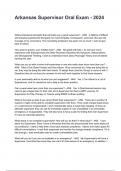Arkansas Supervisor Oral Exam - 2024
What professional strengths that will make you a good supervisor? - ANS A lifetime of difficult
and amazing experiences that grant me much Empathy, Compassion, and Care. But also the
Courage of my convictions. The counseling profession has given me so much. I want to give
back to others.
One area for growth, your Achilles heel? - ANS Not great with kids. I do not have much
experience with Schizophrenia and Other Psychotic Disorders like Delusions, Hallucinations,
and Disorganized Thinking. I want to understand more about Polyvagal Theory and will attend
training this year.
What can you do with a know-it-all-supervisee or one who really does know more than you? -
ANS Take a One Down Position and Also Attune. I'll be concerned b/c if they are doing this to
me, they may be doing this with their clients. I'll assign them (and the Group) to come in with 3
Questions they do not have the answers to and we'll work together to find those answers.
Is your personality able to do what you just suggested? - ANS Yes, I Can Attune to a Lot of
Experiences. And it's natural for me to take a one down position.
Can a supervisee have more than one supervisor? - ANS Yes. A Dual-licensed person may
need to get a Supervisor for their LAC and a Supervisor for there LAMFT Journey. Or
Supervisors for Play Therapy or Trauma using EMDR or Brain spotting.
What is the back-up plan if you cannot finish their supervision? - ANS There are a number of
reasons I might not be able to complete supervision with them. They could change Supervisors,
or I could become incapacitated. I won't intentionally leave a supervisee hanging. I'll have an
alternate supervisor they can call for immediate support if I am unavailable in an immediate
emergency or incapacitated. They will also have to have a plan for finding their own Supervisor
if I have an extended absence.
What about a non-compliant supervisee? How will you do that? In what ways? - ANS I care
about my Supervisee. Since I have a felt-sense that they are disconnected from some aspect of
our profession, I want to help them move back towards compliance. I attune and make space for
difficult conversations. I track their responses and monitor for change towards compliance. If it is
bad enough, I may eventually need to create a remediation plan.
What will you do if you are not available in an emergency? - ANS My Supervisee's will have a
Supervisor I trust that they know they can call if it's that serious of an emergency. In addition, I
, will encourage my Supervisees to also nurture relationships with licensed therapists they can
use as collaborative sources.
Discuss your theory / model of supervision and how will you use it in practical terms? - ANS I
use the Developmental approach extended by the Loganbill, Hardy and Dalworth Model. I also
view life systemically and will use Attachment-Caregiving Model of Supervision.
What are the components of your supervision model? Your process, your elements? - ANS In
the Loganbill model, there are eight professional issues that will always exist: competence,
emotional awareness, autonomy, professional identity, respect for individual differences,
purpose and direction, personal motivation, and professional ethics. Supervisee's will find
themselves in varying levels of comfort, ranging from uncomfortable to more comfortable. The
three process stages are stagnation, confusion, and integration
What if someone is not progressing, moving through the stages? - ANS If someone is not
progressing, I want to explore and understand more of what is happening for them. "It makes
sense. I just do not know how it makes sense." My hope is to help them find their own solutions.
I make implicit explicit. We've got to find a way to talk about the blocks. They cannot fix what
they do not see and cannot fix what they do not understand. We must monitor and make
adjustments to help them make progress.
What if they say they are doing fine, but you are not as sure as they want you to be? - ANS
FINE. I'm going to ask with a smile, "Is that like FREAKED OUT, INSECURE, Neurotic and
EMOTIONAL FINE? At the beginning of each Supervision I'll ask, "How are you doing? No.
Really. How are you really doing?" From the first time I met them, my desire has always been
that they have a safe place with me to be honest and authentic.
Talk about Gatekeeping - ANS I take seriously my role as another gatekeeper in their
professional journey. I'm responsible to protect Arkansas citizens from unethical or unprepared
Associate Counselors. I do that via observation during weekly Supervision Sessions and report
during key milestones in the Associate's journey. Those milestones are the 6 Month
Evaluations, the Level 1 to Level 2 transition, authorizing them to take the NCMHCE, and
determining if they are ready for full licensure.
Are there other components of being a supervisor beyond gatekeeping? - ANS Evaluate
Performance by watching videos, case presentations, checking in about reputation with peers
and other supervisors if they are not in a solo practice, while I am not responsible for them to
submit their CCH Reports and Evaluations every 6 months, I am responsible to making sure
they do so on time. I'll keep records of Individual and Group Supervision concerning Dates,
Times, Subj Matter, and Personal Observations. I'll also maintain a copy of their Statement of
Intent, CCH Hours, and Evaluations.
Discuss your obligation to supervisees who use a different model. - ANS I have an obligation to
be with Supervisees in a manner that will be helpful for them. They are smart and capable of




